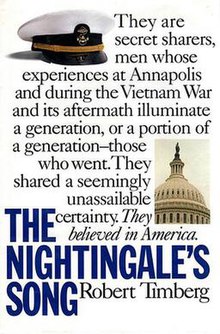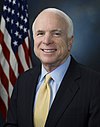
John Sidney McCain III was an American politician and United States Navy officer who served as a United States senator from Arizona from 1987 until his death in 2018. He previously served two terms in the United States House of Representatives and was the Republican nominee for president of the United States in the 2008 election.

John Sidney McCain Jr. was a United States Navy admiral who served in conflicts from the 1940s through the 1970s, including as the Commander, United States Pacific Command.

Robert Carl "Bud" McFarlane was an American Marine Corps officer who served as National Security Advisor to President Ronald Reagan from 1983 to 1985. Within the Reagan administration, McFarlane was a leading architect of the Strategic Defense Initiative, a project intended to defend the US from Soviet ballistic missile attacks. He resigned as National Security Adviser in late 1985 because of disagreements with other administration figures but remained involved in negotiations with Iran and with Hezbollah.

Coco Solo was a United States Navy submarine base and naval air station near the Panama Canal, active from 1918 to the 1960s.

James Henry Webb Jr. is an American politician and author. He has served as a United States senator from Virginia, Secretary of the Navy, Assistant Secretary of Defense for Reserve Affairs, Counsel for the United States House Committee on Veterans' Affairs and is a Marine Corps officer.
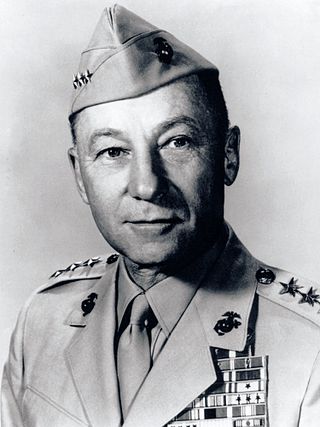
Victor Harold Krulak was a decorated United States Marine Corps officer who saw action in World War II, Korea and Vietnam. Krulak, considered a visionary by fellow Marines, was the author of First to Fight: An Inside View of the U.S. Marine Corps and the father of the 31st Commandant of the Marine Corps, General Charles C. Krulak.

John Walter Ripley was a decorated United States Marine Corps Colonel who received the Navy Cross for his actions in combat during the Vietnam War. On Easter morning 1972, Captain Ripley repeatedly exposed himself to intense enemy fire over a three-hour period as he prepared to blow up an essential bridge in Dong Ha. His actions significantly hampered the North Vietnamese Army's advance into South Vietnam. The story of "Ripley at the Bridge" is legendary in the Marine Corps and is captured in a gripping diorama at the United States Naval Academy.
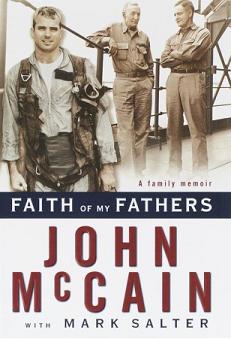
Faith of My Fathers is a 1999 bestselling non-fiction book by United States Senator John McCain with Mark Salter. Published by Random House, it is part autobiography, part family memoir. It traces the story of McCain's life growing up, during his time in the United States Naval Academy, and his military service as a naval aviator before and during the Vietnam War. His story is interwoven with those of his father John S. "Jack" McCain, Jr. and his grandfather John S. "Slew" McCain, Sr., both four-star admirals in the Navy.
The 2000 presidential campaign of John McCain, the United States Senator from Arizona, began in September 1999. He announced his run for the Republican Party nomination for the presidency of the United States in the 2000 presidential election.
The early life and military career of John Sidney McCain III spans the first forty-five years of his life (1936–1981). McCain's father and grandfather were admirals in the United States Navy. McCain was born on August 29, 1936, in the Panama Canal Zone, and attended many schools growing up as his family moved among naval facilities. McCain graduated from the United States Naval Academy in 1958. He married the former Carol Shepp in 1965; he adopted two children from her previous marriage and they had another child together.
John Sidney McCain III retired from the United States Navy in April 1981. His last four years in the service had been spent as the Navy's liaison to the United States Senate. He moved to Arizona with his new wife and, aided by a job from his father-in-law and the contacts it gave him, soon began a new career in politics.
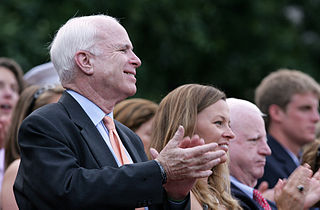
Senator John McCain's personal character has dominated the image and perception of him. His family's military heritage, his rebellious nature as a youth, his endurance over his treatment as a prisoner of war, his resulting physical limitations, his political persona, his well-known temper, his admitted propensity for controversial or ill-advised remarks, and his devotion to maintaining his large blended family have all defined his place in the American political world more than any ideological or partisan framing.
Joseph Pinckney McCain II is an American stage actor, newspaper reporter, and the brother of the late U.S. Senator and two-time presidential candidate John McCain.
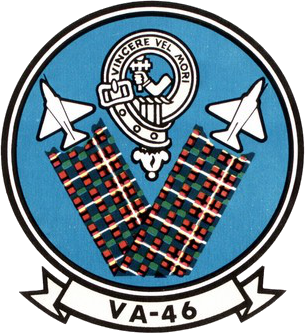
Attack Squadron 46 was an attack squadron of the United States Navy that was active during the Cold War. VA-46 was deactivated as part of the post-Cold War drawdown of forces on 30 June 1991.

Carol Shepp McCain is an American former political aide and event planner who served as the director of the White House Visitors Office from 1981 to 1987, during the Reagan administration. She was the first wife of United States Senator John McCain.
Robert Richard "Bob" Timberg was an American journalist, writer, and author of four books, including The Nightingale's Song.
Members of the United States armed forces were held as prisoners of war (POWs) in significant numbers during the Vietnam War from 1964 to 1973. Unlike U.S. service members captured in World War II and the Korean War, who were mostly enlisted troops, the overwhelming majority of Vietnam-era POWs were officers, most of them Navy, Air Force, and Marine Corps airmen; a relatively small number of Army enlisted personnel were also captured, as well as one enlisted Navy seaman, Petty Officer Doug Hegdahl, who fell overboard from a naval vessel. Most U.S. prisoners were captured and held in North Vietnam by the People's Army of Vietnam (PAVN); a much smaller number were captured in the south and held by the Việt Cộng (VC). A handful of U.S. civilians were also held captive during the war.
